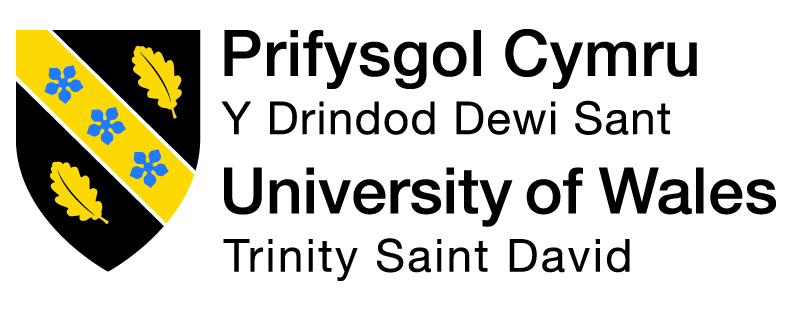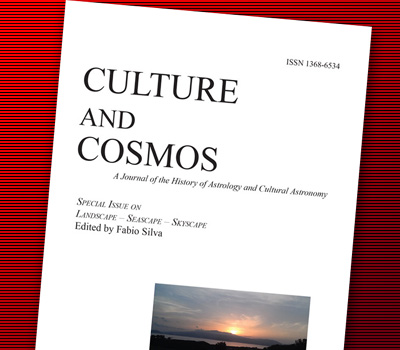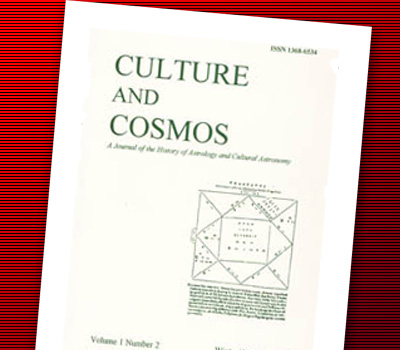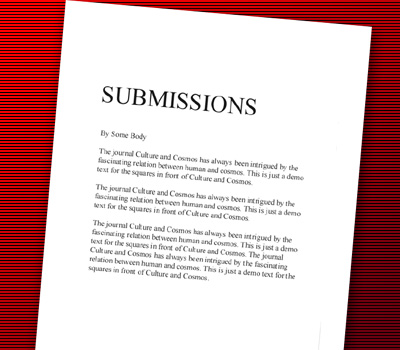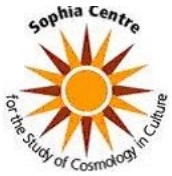We are currently seeking submissions for future volumes of Culture and Cosmos.
Volume 1, No. 2
Review: Graham Douglas, “Greimas’s semiotic square and Greek and Roman Astrology”, Semiotica 114-1/2 (1997), 1-19; and idem, “Color-term connotations, planetary personalities, and Greimas’s square”, Semiotica 115-3/4 (1997), 263-287
Patrick Curry
There is, of course, more than one way to study astrology and cultural astronomy. The natural bias of this journal is toward the historical, and to some extent sociological. Readers may be interested, however, to learn of Graham Douglas’s pioneering work on the less familiar ‘synchronic’ front, which involves analysing astrology, by analogy with language, as a structure or system of qualitative correspondences.
Numerical but not quantitative, this programme is concerned with form and formal causes rather than material. In that sense, it has ancient Aristotelian roots, as well as affinities with Goethe’s scientific method (currently undergoing a sympathetic re-appraisal). The key names, however, are contemporary: broadly speaking, systems theory and its offshoots, including René Thom and catastrophe theory, and Ilya Prigogine and chaos theory. Another tributary is the work on Indo-European cosmology of Georges Dumézil and its recent updating by Emily Lyle; while the seminal structuralism of Ferdinand de Saussure, including its semantic applications by A.-J. Greimas and anthropological ones by Claude Lévi-Strauss, is central. (The last has some interesting similarities to the psychological structures posited by someone more commonly associated with astrology, Carl Jung.) Finally, there is the important work by Berlin and Kay – significantly revised since their pioneering book in 1969 - on cross-cultural colour terms.
The overall intellectual context for this work is the search for a naturalised but non-reductive epistemology - at once social, psychological and cognitive - that was arguably set in motion by Gregory Bateson, and is now being pursued by Maturana and Varela, among others. A closely related programme is a new holistic, autopoetic or self-organising approach to the way the brain works (which rejects the computer model entirely).
Drawing on these resources, what Douglas finds is tantalisingly extensive if sometimes imperfect correspondences between the symbolic language of astrology and other complex systems such as semiotic analyses of narrative and folk-tales, colour terms and symbolism, personality dimensions and scales, and Indo-European social structures and cosmologies.
His results thus suggest two things. One is the possibility of a set of relative universals at work in astrological symbolism: an alarming prospect, perhaps, for historians! But it is one that should be faced up to and followed through, despite the formidable intellectual difficulties (which Douglas’s own dense style reflects). Besides, “universals” hardly manifest themselves perfectly in a timeless vacuum. And an uncompromisingly “diachronic” intellectual programme, in which time and change is absolutely everything, is ultimately as unattractive (and unrealistic) as the overly abstract aridities of its “synchronic” counterpart. Where the weakness of the latter is Theory, the former tendency has a danger too: the descent into an anti-intellectual antiquarian empiricism, masquerading as history. The truth is almost certainly somewhere in the conceptual middle, and muddle, where these two dimensions and their respective approaches interact.
This point relates to the other prospect he raises, which concerns research methodology. The dominant way of investigating astrology in modern times has been firmly quantitative and empiricist, based on just the Cartesian-Galilean-Newtonian assumptions about “the” scientific method that the above-mentioned work has increasingly thrown into question. To varying extents, this model and its negative results have even dominated, or at least influenced, social scientific and historical investigations, where its “residues of unresolved positivism” (to use the late Owen Barfield’s term) are clearly inappropriate and unhelpful. Douglas’s work, in contrast, constitutes an argument for an anthropologically and culturally sophisticated formalism, which evidently holds the promise of a more fruitful avenue for future scientific research. There are a number of printer’s errors affecting Fig. 13 on p. 12 of the first paper; for a corrected version, please apply to Graham Douglas, 57 Brunswick Square, Hove, BN3 1EF

